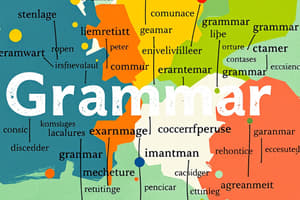Podcast
Questions and Answers
What type of words are nouns?
What type of words are nouns?
- Words that modify verbs
- Words that express actions
- Words that describe nouns
- Words that name people, places, things, or ideas (correct)
Which of the following is NOT a type of tense in English verbs?
Which of the following is NOT a type of tense in English verbs?
- Past
- Progressive (correct)
- Future
- Present
Which statement best defines phonetics?
Which statement best defines phonetics?
- Study of sound systems and patterns
- Study of meaning in language
- Study of contextual language use
- Study of sounds in human speech (correct)
What is the correct structure of a basic English sentence?
What is the correct structure of a basic English sentence?
Which of the following are types of vowels in English?
Which of the following are types of vowels in English?
Which English variant is associated with the Indian subcontinent?
Which English variant is associated with the Indian subcontinent?
Which of these authors is NOT typically associated with English literature?
Which of these authors is NOT typically associated with English literature?
What role does English serve in many international contexts?
What role does English serve in many international contexts?
Flashcards are hidden until you start studying
Study Notes
Overview of English Language
- English is a West Germanic language.
- Official language in over 70 countries.
- Widely used as a second language globally.
Phonetics and Phonology
- Phonetics: Study of sounds in human speech.
- Phonology: Study of sound systems and patterns.
- Key features:
- Vowels (e.g., a, e, i, o, u)
- Consonants (e.g., b, c, d, f, g)
Grammar
- Nouns: Words that name people, places, things, or ideas.
- Types: Common, proper, collective, abstract.
- Verbs: Words that express actions or states of being.
- Tenses: Present, past, future.
- Adjectives: Words that describe nouns.
- Adverbs: Words that modify verbs, adjectives, or other adverbs.
- Sentence Structure: Subject + Verb + Object (SVO).
Vocabulary
- Lexicon: The complete set of words in a language.
- Word Formation:
- Derivation (adding prefixes/suffixes)
- Compounding (combining words)
Semantics and Pragmatics
- Semantics: Study of meaning in language.
- Pragmatics: Contextual use of language and its effects on meaning.
Dialects and Variants
- Regional differences in pronunciation, vocabulary, and grammar.
- Major variants include:
- British English
- American English
- Australian English
- Indian English
Literature
- Significant periods include:
- Old English (450-1150)
- Middle English (1150-1500)
- Modern English (1500-present)
- Notable authors: Shakespeare, Austen, Dickens, Hemingway.
Usage
- English serves as a lingua franca in many international contexts (business, science, technology).
- Importance of English proficiency in global communication.
Overview of English Language
- English belongs to the West Germanic language family.
- It is recognized as the official language in more than 70 countries worldwide.
- English is one of the most commonly spoken second languages across the globe.
Phonetics and Phonology
- Phonetics involves analyzing the physical properties of sounds in human speech.
- Phonology examines the way sounds function and pattern within a language's system.
- Essential elements include:
- Vowels such as a, e, i, o, u.
- Consonants, including b, c, d, f, g.
Grammar
- Nouns designate entities like people, places, things, and concepts.
- Types of nouns encompass:
- Common (general names)
- Proper (specific names)
- Collective (groups)
- Abstract (ideas).
- Verbs communicate actions or states of existence with tenses categorized as present, past, and future.
- Adjectives provide descriptions to nouns, enriching language.
- Adverbs are modifiers for verbs, adjectives, and even other adverbs, enhancing descriptive precision.
- The fundamental sentence structure in English follows the order of Subject + Verb + Object (SVO).
Vocabulary
- The lexicon represents the complete set of words utilized in English.
- Word formation processes include:
- Derivation through prefixes and suffixes to create new words.
- Compounding, which merges two or more words into a single entity.
Semantics and Pragmatics
- Semantics focuses on understanding meanings attributed to different words and sentences.
- Pragmatics studies how context impacts the interpretation and use of language.
Dialects and Variants
- English displays significant regional variations in pronunciation, vocabulary, and grammatical structures.
- Prominent dialects and variants include:
- British English
- American English
- Australian English
- Indian English.
Literature
- The evolution of English literature spans significant periods:
- Old English (circa 450-1150): characterized by Anglo-Saxon literature.
- Middle English (circa 1150-1500): marked by works like Chaucer's "Canterbury Tales."
- Modern English (1500-present): includes works of Shakespeare and other influential authors.
- Notable literary figures encompass Shakespeare, Jane Austen, Charles Dickens, and Ernest Hemingway.
Usage
- English acts as a lingua franca in various global scenarios, especially in business, science, and technology.
- Proficiency in English is crucial for effective communication in international contexts.
Studying That Suits You
Use AI to generate personalized quizzes and flashcards to suit your learning preferences.



